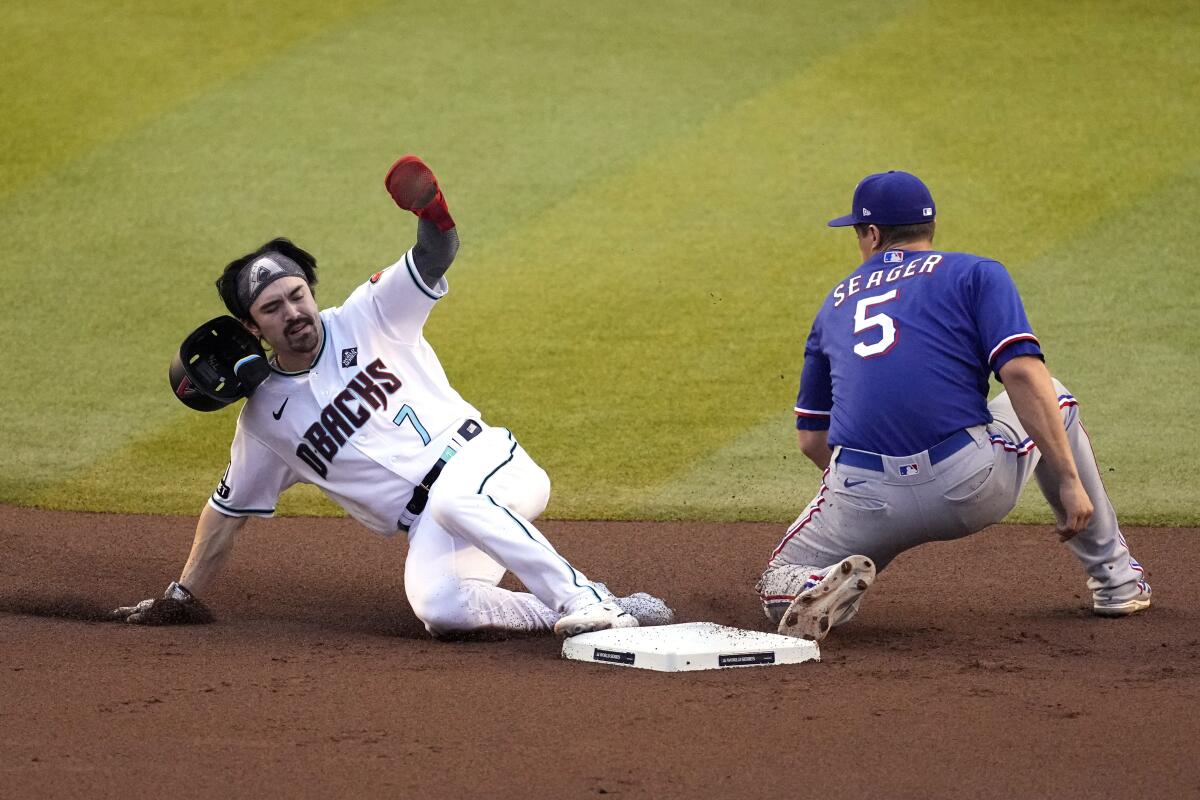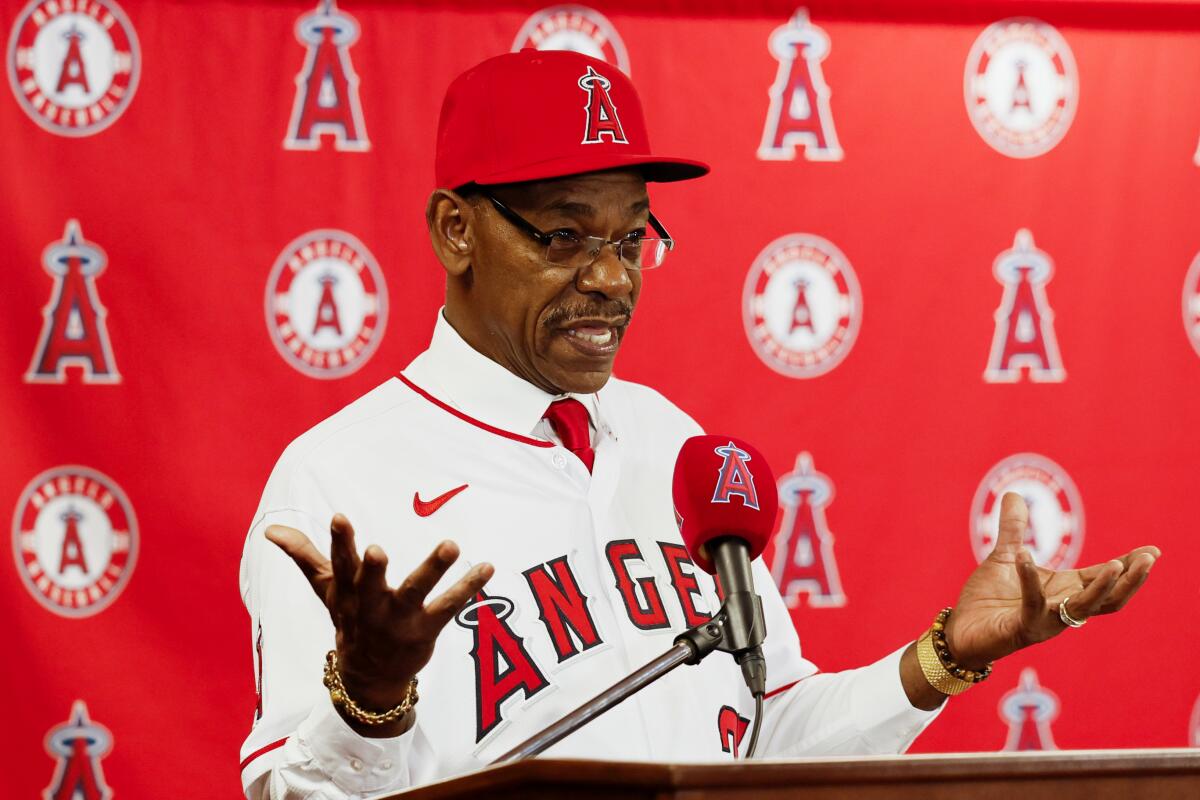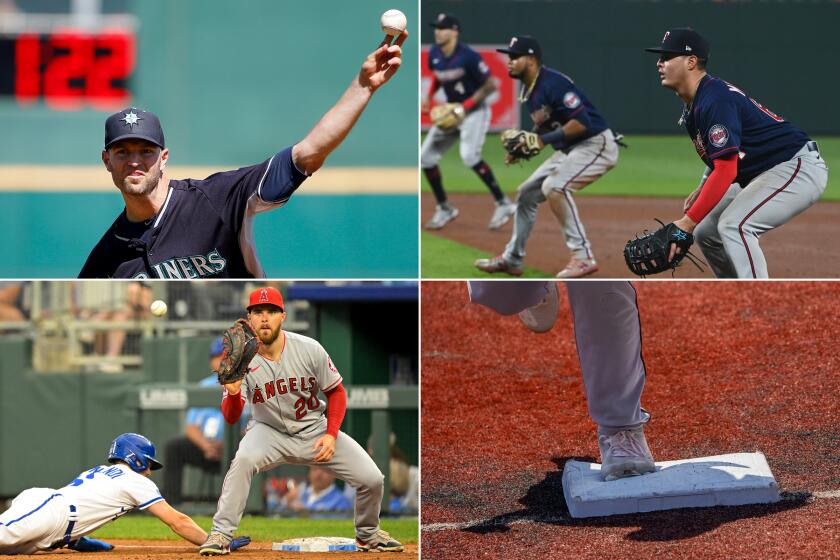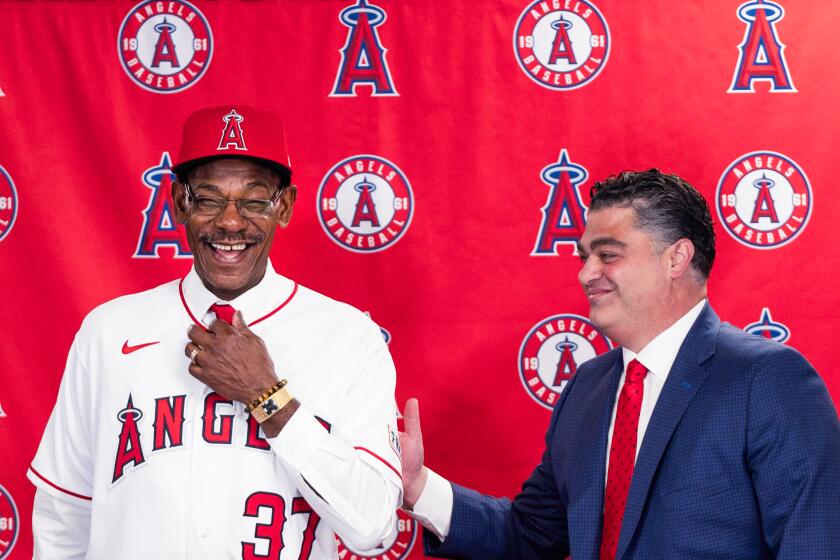The return of small ball can result in big benefits. Just look at the Diamondbacks

- Share via
Ron Washington was introduced as manager of the Angels last week with the usual pomp and circumstance for such occasions. There was an emcee. There were current and former players in attendance. Organizational staff filled the room.
Washington vowed to “run down” his American League West foes. Buzzwords like “culture” and “positivity” were sprayed, and Washington was touted as “the right man for the job.”
Buried beneath the cliches and Washington’s bravado was something more substantive: how the Angels will play baseball next year. Or at least how Washington wants his team to play baseball.
“My style is b-a-s-e-b-a-l-l,” Washington spelled out.
A pitch clock, pickoff limit, the changing of shifts on defense and bigger bases could make for a different game in the upcoming season.
The 71-year-old baseball lifer then placed a hand in front of his eyes.
“This is baseball,” Washington said. “Everything that’s under baseball, we’re going to be a part of it. We’re not going to pick and choose what we’re going to do as far as playing the game of baseball. We’re going to play baseball.”
So, what does that mean exactly? Ultimately, not relying just on hitting home runs to win games. A modern-day small ball.
That is a departure from the way Major League Baseball clubs were trending for more than a decade. A heavy reliance on three-true-outcome hitters — players who hit home runs and accumulate walks while stomaching a once-nauseating amount of strikeouts — became the preeminent offensive formula to win regular-season games for different reasons.
Pitchers were throwing harder with nastier stuff than ever. Thorough defensive shifts made stringing hits together more difficult. Aggressive bullpen usage amplified the run prevention. As a result, batting averages plummeted. Strikeouts increased. Walks and home runs were prized. Selective sluggers became more prevalent while the running game and contact hitters were deemphasized.
This past season, however, might have marked the beginning of a subtle philosophical reversal that correlates with Washington’s small-ball vision for the Angels.
Of the several rules MLB introduced this season, none received more attention than the pitch clock. For good reason. The clock’s presence was obvious. Less heralded — and criticized — were the other changes implemented to encourage more action: infield shift restrictions, bigger bases and a limit on pickoff attempts.
The impact was instant. Players registered 3,503 stolen bases — 1,017 more than in 2022 and the most since 1987. Their 80.2% success rate was the highest ever while stolen base attempts increased month by month during the season. The average batting average climbed five points from 2022 to .248. The average number of runs scored per game jumped from 8.6 in 2022 to 9.2.
Home runs, strikeouts and walks also rose, but another avenue to success possibly was opened enough for clubs to reevaluate their approaches while satisfying MLB’s desire to foster more action.
There wasn’t a better example than the Arizona Diamondbacks, an 84-win team that swept the Dodgers out of the National League Division Series during an improbable World Series run.
The Diamondbacks’ 166 home runs this season were tied for 22nd in the majors. Their .408 slugging percentage was 17th. But their 166 stolen bases were second. Their 6.0 speed score, per FanGraphs, ranked first. Behind rookie sensation Corbin Carroll, they used athleticism and speed to apply pressure on opponents. In October, those attributes changed games.
Down 3-2 in the National League Championship Series, Arizona tallied four steals in each of the final two games to rally to beat the Philadelphia Phillies on the road to advance to the World Series.

In Game 2 of the World Series, 38-year-old third baseman Evan Longoria dropped his second career sacrifice bunt to spark a win. In Game 5, an elimination game, Arizona’s No. 3 hitter, Gabriel Moreno, recorded his first bunt. Small ball mixed with elite defense was their brand.
“They’re unbelievably athletic,” said Texas Rangers general manager Chris Young, whose team defeated Arizona to win the World Series. “And they wreak havoc on the bases and we certainly had to deal with that in the World Series. When they’re on the bases, they’re a distraction.
“I think that is a way to build your team and it’s a competitive advantage. And certainly it’s a fun style of baseball. I know how hard it was for us to defend against that and I don’t anticipate that going away.”
The Diamondbacks didn’t build their roster for the new rules. It was a coincidence they realized could be used to their advantage two years after losing 110 games.
“We ended up drafting a lot of high-athletic, speed guys that have kind of come up through our system, and it coalesced with the rule changes,” Arizona general manager Mike Hazen said. “And, yes, as the rule changes were coming out and we heard the discussions of them, we felt like we had an opportunity with the team we had to make a jump from where we were last year and turn our offense into a different type of offense than we were able to have before. And we had a lot of success with it.”
Last winter, in his first few months as the Detroit Tigers’ president of baseball operations, Scott Harris emphasized infusing athleticism into his club’s rebuild. The UCLA graduate saw the incoming rules changes and recognized an opportunity. The Diamondbacks’ postseason success only solidified what he anticipated.
“I was texting people like, ‘Hey, did you see how much pressure a D-backs runner was putting on a pitcher that ultimately may have impaired his ability to throw a backdoor slider that ultimately ended up middle-middle and Christian Walker pounded to right-center?’” Harris recalled.
“It really matters. Just because you can’t measure those things doesn’t mean they’re not valuable. In this game, with the new rules, adding athleticism is even more valuable than it used to be. And they just demonstrated that.”
The small-ball movement isn’t just small-to-medium-market organizations.
This month New York Yankees owner Hal Steinbrenner spoke to reporters on an unusual video call for the first time since MLB’s most storied franchise completed a disappointing 82-win season.
The Angels have a new manager, but the burdensome contracts of Anthony Rendon and Mike Trout are why they still have major problems.
Steinbrenner shared that the organization recently underwent a self-evaluation period. He said changes were coming to get the Yankees back on track to reaching the World Series for the first time since 2009. But he was short on examples. Finally, he offered one: The Yankees are going to make teaching players how to bunt more of a priority. Yes, bunt.
The franchise of Ruth and Gehrig and Mantle and Jackson and Judge was going to emphasize the bunt. The declaration was met with jokes on social media. And not everybody in the industry is ready to declare that a small-ball renaissance is among us.
“I mean, not to be a total grinch, but I think until someone can show the correlation between bunting and running and winning, I don’t think we’re going to see a huge change,” Oakland Athletics general manager David Forst said. “I think the Diamondbacks took advantage of their specific personnel really well, but I don’t think that necessarily is going to prove to be right for everybody.”
Washington believes it’ll prove right for his new ballclub. So next year a more old-school approach is expected to take hold in Anaheim — with or without Shohei Ohtani — for an organization searching for its first postseason win since 2009.
“The teams that are successful have that style,” Washington said. “They don’t pick and choose — unless you got a group that can constantly get you three-run home runs. Other than that, we’re going to try to scratch runs when we have to scratch them.
“That’s my style. I’m not copying nobody’s style. We’re just going to play baseball and whatever comes under baseball, that’s what you’re going to see.”
More to Read
Go beyond the scoreboard
Get the latest on L.A.'s teams in the daily Sports Report newsletter.
You may occasionally receive promotional content from the Los Angeles Times.













